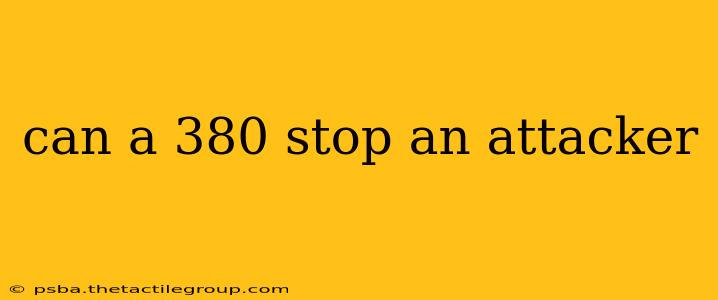Can a .380 Stop an Attacker? A Comprehensive Look at Self-Defense with the .380 ACP
The question of whether a .380 ACP (Automatic Colt Pistol) can stop an attacker is complex and doesn't have a simple yes or no answer. Effectiveness depends on a multitude of factors, extending far beyond the caliber itself. While the .380 is a popular choice for concealed carry due to its small size and manageable recoil, understanding its limitations and advantages is crucial for responsible self-defense.
Factors Influencing Stopping Power
Several key factors determine the effectiveness of any firearm in a self-defense scenario:
-
Shot Placement: This is arguably the most critical factor. A well-placed shot to vital areas (heart, lungs, brain) will have a much higher chance of stopping an attacker, regardless of caliber. Poor shot placement, even with a larger caliber, can significantly reduce effectiveness. Practice and training are paramount.
-
Ammunition Selection: The type of ammunition used drastically impacts stopping power. Hollow-point ammunition, designed to expand upon impact, generally causes more tissue damage and a greater chance of incapacitation than full metal jacket (FMJ) rounds. Research and choose ammunition specifically designed for self-defense.
-
The Attacker's Physiology and Condition: An attacker's size, physical condition, drug or alcohol use, and adrenaline levels all influence how they react to being shot. What might incapacitate one person may have less effect on another.
-
The Shooter's Skills and Training: A skilled shooter who can accurately place shots under pressure will have a much greater chance of success than someone who lacks proper training. Regular practice and realistic scenario training are essential for effective self-defense.
The .380 ACP: Advantages and Disadvantages
Advantages:
-
Concealability: The .380's small size makes it ideal for concealed carry, especially for individuals with smaller hands or who prefer a less bulky firearm.
-
Recoil: It has manageable recoil, making it easier to control, especially for those new to firearms or with less upper body strength. This allows for faster follow-up shots, crucial in a self-defense situation.
-
Availability: .380 ACP ammunition is widely available and relatively affordable.
Disadvantages:
-
Stopping Power Compared to Larger Calibers: The .380 ACP generally has less stopping power than larger calibers like 9mm or .45 ACP. This means there's a higher chance that multiple shots may be needed to neutralize a threat.
-
Penetration: While penetration is important for ensuring sufficient incapacitation, excessive penetration can pose risks to bystanders. Choosing appropriate ammunition is crucial to balance stopping power and penetration.
Conclusion: Is a .380 Enough?
The .380 ACP can be an effective self-defense tool, provided the user understands its limitations and commits to rigorous training. It's not a magic bullet; its success hinges on accurate shot placement, proper ammunition selection, and the shooter's skills. While it may not offer the same stopping power as larger calibers, its concealability and manageable recoil make it a viable option for many individuals.
Disclaimer: This information is for educational purposes only and should not be considered legal or medical advice. Always consult with a qualified firearms instructor and legal professional before making decisions regarding self-defense and firearm ownership. Responsible gun ownership includes thorough training, safe handling practices, and adherence to all applicable laws and regulations.

